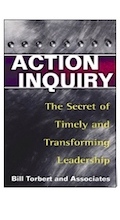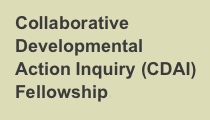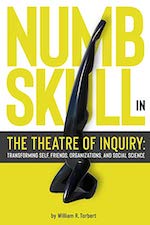Trumping Trump by William Torbert ©
If developmental theory and the practice of Collaborative Developmental Action Inquiry (CDAI) truly have practical value and transformational potential, then it must be important to know the center-of- gravity action-logic of the most powerful person in the world – namely, Donald Trump. And to learn something about how to trump him, if it comes to that.
People ask me what Donald Trump’s center-of- gravity action-logic is, and my response is Opportunist.
Then people say “How do you know? He hasn’t taken the Global Leadership Profile (GLP) has he?” No, he hasn’t. But one aim of CDAI is to learn how to make estimates of another’s action-logic based on that person’s behavioral patterns, using both prior research based on the GLP and one’s own clinical skills of interpretation in the field.
“Anyway,” they continue, “almost no managers you’ve ever measured – let alone anyone as successful as he is – score as Opportunists.” True enough.
“Isn’t Trump actually,” they conclude, “the epitome of an Achiever?” I agree that if one looks only at the monetary wealth he has accrued, Trump does look like an Achiever (although even here, the alternation between big profits and big losses in his different ventures, as well as the amount of short-term debt he carries looks more Opportunist than Achiever). Anyone who treats Trumps “Achiever-clothing” as his operating action-logic (and some of our Action Inquiry Fellows argue so) is in for a rough awakening. An Opportunist is far less conventional than an Achiever and will gladly eat your lunch.
If one looks at Trump’s daily behavior patterns, he sure looks like an Opportunist. He is famous for his short time span of attention, evident in his tweets, his inability to let others speak more than a sentence at a time in his presence (e.g. Mike Pence on “60 Minutes”), and his inability to develop coherent policy, let alone write his own autobiography. He is particularly famous for his flamboyant use of unilateral executive power, as in “You’re fired!” He focuses on concrete things (real estate, buildings, golf courses, “The Wall,” his name in gold). He rejects critical feedback out of hand, externalizing blame and mounting counter-attacks (such as law suits) until attention shifts to other issues. He exhibits hostile humor (e.g.mimicking a disabled journalist). He flouts sexuality and treats as legitimate “whatever one can get away with.”
He has been able to be as successful as he is for three main reasons: 1)because he started with a very large capital stake from his father, enabling him to afford law suits and punish enemies (whoever disagrees with him!) unilaterally from the outset; 2) because he “works all the time,” thus making “winning” a higher priority than anything (and anyone) else (does); and 3) because he’s never before been accountable to a boss, board or electorate. Now that he also has the most power of anyone in the world it’ll be harder than ever to beat him straight-on before the next presidential election.
Since, however, Trump thinks only tactically and his greatest skills are in catching others by surprise, he will unintentionally tend to create an increasingly dangerous set of network conflicts among companies, industries, government-
departments, and nations.
What is to be done? The public media may yet have their finest hours ahead of them. How to speak truth to power, indeed! Or better, how to speak and listen with love, with power, and with inquiry? Virtually no one knows how to interweavelove, power, and inquiry in action very well. May the professional media lead the way! David Brooke’s New York Times analysis on January 3 exemplifies such leadership (and is consistent with the analysis offered here).
Another whole sector that has the potential to model responsible action inquiry, based more on mutual power than on unilateral power is the Federal bureaucracy. Federal employees must beware to operate within current law and procedure. They should also know at what limit they are prepared to resign in as public a way as possible, and what their next steps will be if fired.
The public in general should be teaching itself how to create cultures of wonder (of collaborative inquiry and of mutually-transforming power) rather than cultures of hate (of blame and coercive power). Anyone can begin this learning process in their work teams, their families, and/or their friendship circles by devoting some proportion of their time (e.g. two hours per month) to developing cultures of wonder together and practicing how action inquiry can gradually dissolve cultures of hate. Also, members of the public who have never before participated in protest rallies or in non-violent civil disobedience should seriously consider these action inquiry avenues.
All of our worldwide Action Inquiry Associates activities in the calendar of 2017 events in the right hand column involve co-constructing cultures of wonder. Members of our Action Inquiry Fellowship devote 6 days a year to meeting together to wonder-in-action. We ask, how can we among ourselves generate timely interaction – the mutually-transforming power of love in the spirit of inquiry? And all of us devote most of our year to sharing our wonder-full practices with our clients or students.
In addition, many of us are now using the new TRANSFORMATIONS card deck for students or clients, so that they can make first-person self-diagnoses of their leadership action-logic; who can use the cards to tell their own story; and then to see how their self-diagnosis relates to their possibly ongoing leadership action-logic transformations, from the more unilateral earlier action-logics to the more mutual, later action-logics . The card deck is opening the way to doing this work in Africa and South America, China and Japan, not to mention larger audiences everywhere. See Transformations™ for global reports of using the TRANSFORMATIONS card deck and for its introductory 40% price cut.
At the same time, we also continue to offer the Global Leadership Profile (GLP) – the third-person measure of developmental action-logics with the most up-to-date reliability and validity testing. The basic book Action Inquiry: The Secret of Timely and Transforming Leadership appeared in Japanese in 2016 and is currently being translated into German, Russian, and Chinese. Also, Action Inquiry Fellowship members Hilary Bradbury and Bill Torbert published the critically praised Eros/Power: Love in the Spirit of Inquiry in 2016.
In 2017, may slow trump fast and may mutuality, if necessary, trump Trump.
Game on.








{ 3 comments… read them below or add one }
Respectfully, Bill, I disagree wholeheartedly with your assessment. I understand that the point of your article is to open a conversation about how people who oppose Trump can do so effectively. Your title is evident of that and it is interesting you frame it as such (is that a zero-sum win/lose frame?). But your analysis of his center-of-gravity action logic is quite off base.
In my assessment, Trump is one of the purest Magicians you have yet to meet. His ability to reframe issues and transform meaning is second to none. What you see as “Opportunist” behavior in the “short span of attention tweets”, I see it as unique ability to transform language and meaning. What you see as “unilateral executive power” in the Apprentice, I see it as an elaborate exercise in self-branding (as a “Strategist” would do) with no particular aim at heart, other than elevating his profile to the general public. The show was billed as deathmatch competition so the firing principle was par for the course, but in the show he also gave a lot of business principles that defy the pure “Achiever” mindset, e.g. “money is important because it is a scorecard of how you are doing.” What you see as “rejecting feedback out of hand”, I see it as timely leadership in reframing issues in real time. Also on the point of feedback: we do not know what he does in private. I would wager that he is a very contemplative person (“works all the time”) and that he listens to his advisors, of which he has many. What you see is only what his public persona allows you to see.
Secondarily, in your analysis of his success and political ascendance, you use factoids that either have been disproven (e.g. mocking a disabled journalist), are cherry-picked by his own political adversaries, or are simply unknowable facts (e.g. how rich he truly is and how he got his riches). I fear that those cloud your judgment and are not giving him enough credit. I always remind myself that he is a private person, and businessman, so whatever knowledge (we think) we have on him is at best haphazard.
In your work I have learned about how a person that has reached a later action logic can channel earlier action logics when the situation requires it, and Trump seems to me be channeling multiple ones when the situation requires it but from the vantage of a Magician.
John’s comments above about the epistemic limits that we face when trying to judge Donald Trump are, I think, John’s most important point: e.g., “we do not know what he does in private”; “what you see is only what his public persona allows you to see”; “simply unknowable facts”; “whatever knowledge (we think) we have on him is at best haphazard.”
Because our knowledge of Trump is inevitably limited, we have to rely to some degree on people who have studied Trump closely and written books on him, such as Wayne Barrett, Gwenda Blair, Michael D’Antonio, Harry Hurt, Tim O’Brien, Tony Schwartz. As far as I know, none of these people have written anything that supports the hypothesis that Trump is secretly commanding a later-action logic but projecting earlier action-logics “when the situation requires it” as John suggests. Do these people’s books truly point to the hypothesis that John suggests? I doubt it. An interview with some of those people on the eve of Trump’s inauguration can be found in Politico Magazine: http://www.politico.com/magazine/story/2017/01/trump-biographers-presidency-legitimate-214655
I used to suspect that Trump had more going for him than it first looked and was intentionally altering his behaviour in a calculated way. Not uncommon for politician’s.
Fire & Fury suggests that view gives him more credit than he deserves and I now feel Bill’s original analysis hits the mark.